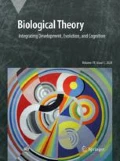Abstract
Re-Engineering Philosophy for Limited Beings is about new approaches to many of the big topics in philosophy of science today, but with a very different take. To begin with, we are urged to reject the received Cartesian-Laplacean myths: Descartes’ certainty and Laplace’s computational omniscience. Instead, Wimsatt re-engineers a philosophy for human beings with all their cognitive limitations. His approaches find their starting point in the actual practices of scientists themselves, which he strongly identifies with engineering practices as the source of researchers’ solutions for dealing with a complex world. He aims to construct an understanding of scientific methodology around the central role of reduction. But he dismisses eliminative reductionism in favor of a heuristic-based realist view. Wimsatt’s world is a complex one, and this means that science needs to do away with all the absolute and simple answers, because they do not reflect the world we are living in. A complex world requires the mindset and tinkering of an engineer to uncover its reality. The appropriate response must be heuristics all the way down as we constantly seek out reliable inferences on often shifting ground. To this end, we aim for models and theories that are robust, just as engineers aim to build robust machines. And although errors occur and approaches are fallible, they allow us to continually adapt the heuristics applied and sharpen our perceptions so as to develop more refined tools for investigating and understanding the world.
Similar content being viewed by others
Notes
Editor’s note: This in-depth examination of a book that has attracted wide interest among Biological Theory’s readers was under preparation at the time of death of one of its authors, Werner Callebaut, the journal’s former editor-in-chief. Although it has now been several years since the book appeared, we have chosen to run this essay review as the opening article for our Special Issue on Recent Books.
References
Calcott B (2010) Wimsatt and the robustness family: review of Wimsatt’s re-engineering philosophy for limited beings. Biol Philos 26:281–293
Callebaut W (1993) Taking the naturalistic turn, or how real philosophy of science is done. University of Chicago Press, Chicago
Callebaut W (2012) Scientific perspectivism: a philosopher of science’s response to the challenge of big data biology. Stud Hist Philos Biol Biomed Sci 43:69–80
Campbell DT (1958) Common fate, similarity, and other indices of the status of aggregates of person as social entities. Behavioural Sci 3:14–25
Campbell DT (1969a) Ethnocentrism of disciplines and the fish-scale model of omniscience. In: Sherif M, Sherif CW (eds) Interdisciplinary relationships in the social sciences. Aldine, Chicago, pp 328–348
Campbell DT (1969b) Definitional versus multiple operationalism. In: Overman ES (ed) (1988) Methodology and epistemology for social sciences: selected papers. University of Chicago Press, Chicago, pp. 31–36
Castle WE (1919) Is the arrangement of the genes in the chromosome linear? Proc Natl Acad Sci 5:25–32
Feynman RP (1967) The character of physical law. MIT Press, Cambridge
Giere R (2006) Scientific perspectivism. Chicago University Press, Chicago
Glymour C (1980) Theory and evidence. Princeton University Press, Princeton
Harrington MJ, Hong E, Brewster R (2009) Comparative analysis of neurulation: first impressions do not count. Mol Reprod Dev 76:954–965
Levins R (1966) The strategy of model building in population biology. Am Sci 54:421–431
Lewontin R (1991) Facts and the factitious in natural sciences. Critical Inquiry 18:140–153
Müller GB, Newman SA (1999) Generation, integration, autonomy: three steps in the evolution of homology. In: Bock GK, Cardew G (eds) Homology (Novartis Foundation Symposium 222). Wiley, Chichester, pp 65–73
Quine WVO (1960) Word and objects. MIT Press, Cambridge
Riedl R (1975) Die Ordnung des Lebendigen. Paul Parey, Hamburg and Berlin
Rosenberg A (2006) Darwinian reductionism: or, how to stop worrying and love molecular biology. University of Chicago Press, Chicago
van Fraassen B (2008) Scientific representation. Paradoxes of perspective. Oxford University Press, New York
West-Eberhard JJ (2003) Developmental plasticity and evolution. Oxford University Press, Oxford
Wimsatt WC (2007) Echoes of Haeckel? Reentrenching development in evolution. In: Laubichler MD, Maienschein J (eds) From embryology to evo-devo: A history of developmental evolution. MIT Press, Cambridge and London, pp 309–355
Acknowledgments
The authors want to thank Gerd B. Müller for co-organizing the interdisciplinary seminar on “Selected Problems in the Philosophy of Biology” in March to June 2011 and hosting the discussion roundtables at the Department of Theoretical Biology of the University of Vienna. We also want to express our gratitude to Ehab Abouheif (McGill University, Montreal) who inspired the discussants by providing extremely valuable insights into the scientific realms of evolutionary developmental biology.
Author information
Authors and Affiliations
Corresponding author
Additional information
Werner Callebaut (1952–2014).
Christoph Frischer, Julia Lang, and Martin Schlumpp—University of Vienna, participants in the seminar “Selected Problems in the Philosophy of Biology,” Vienna, Austria.
Rights and permissions
About this article
Cite this article
Sarto-Jackson, I., MacLeod, M., Handschuh, S. et al. A Piecewise Aggregation of (Some) Philosophers’ and Biologists’ Perspectives. Biol Theory 11, 1–10 (2016). https://doi.org/10.1007/s13752-016-0235-5
Received:
Accepted:
Published:
Issue Date:
DOI: https://doi.org/10.1007/s13752-016-0235-5




